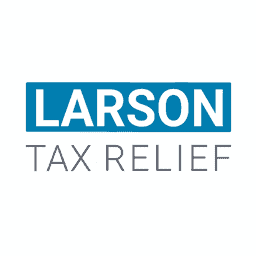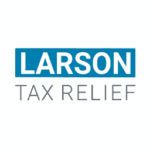If you’re dealing with a bank levy or wage garnishment, learn how Larson Tax Relief can help stop or reverse collection action and buy time to solve the issue.
About Larson Tax Relief
Larson Tax Relief is a family-owned and operated tax resolution firm. With over 16 years of experience in the field, their team of 65 employees and 17 federally licensed IRS Enrolled Agents specialize in providing solutions to businesses and individuals for IRS and state tax-related matters.
The firm is accredited by the Better Business Bureau with an A+ rating. Company president and federally licensed Enrolled Agent Jack Larson is also a member of the National Association of Tax Professionals and the National Association of Enrolled Agents.
Wage Garnishments
If your wages are garnished by the State or Federal taxing authorities, your paychecks could be a lot smaller than you need. Unpaid tax obligations can be collected by the IRS and State by taking all or some of your earned income straight from your pay. Wages can be garnished for back taxes as well as other consumer debts, medical bills, student loans, child support, and alimony.
What Is Wage Garnishment?
Wage garnishments for back taxes occur when the IRS or State tax agencies demand all or a percentage of your paycheck to be withheld from you and sent directly to them as payment toward tax arrears owed. They begin the process by sending U.S. Mail to your payroll department at work that legally requires your employers to send them your earnings. Generally this type of aggressive enforcement happens when the taxing authority feels you are severely delinquent in your tax obligations.
You will be sent a garnishment notice to your last known address before the beginning of a garnishment, generally giving you 30 days to pay the balance due or face garnishment. The IRS and State will typically also explore levying your funds from your bank accounts as well. The garnishment continues until the debt is paid in full, or other terms are negotiated with teh collecting party, on your behalf.
How Much of Your Wages Can Be Garnished?
It depends on who is garnishing your checks, but for back taxes various States and the IRS may garnish up to 100 percent of your post-tax income which can leave a taxpayer scrambling to make ends meet.
Types of Garnishments
The IRS and State can garnish income like paychecks from a W2 employee, income for a self employed individual (1099), or even receivables for business to recoup back taxes. Garnishment of a bank account is actually called a “bank levy.”
How to Prevent or Stop Wage Garnishments
If wages being garnished are a result of tax debt, it is recommended you hire a professional that’s well-versed in tax law to resolve the issue on your behalf. The Larson Tax Relief team can assess your situation and discuss ways to stop and reverse your wage garnishment. Their consultation is free, and they can begin working on your case right away.
Tax Levy
The IRS or State department of revenue can issue multiple bank levies to seize the funds in your checking, savings or retirement accounts if you owe back taxes.
What Is a Bank Levy?
In short, a bank levy amounts to the seizure of funds from your bank account to be applied to unpaid tax debts. Typically the government will file a lien on you or your company before levying any funds from your accounts.
In addition to bank levies, the IRS or state can also take the following actions to resolve unpaid tax debt:
- Seizure of property (vehicles, real estate, RVs, boats, livestock)
- Garnish wages or social security income
- Levy earned commissions, self employment income, rental income, retirement accounts and even a business’ accounts receivable
Generally, government tax agencies can levy after they have made a reasonable attempt at mailing a notice of intent to levy outlining a balance due.
How Often Can the IRS or a Creditor Levy Your Bank Account?
There is not a limitation on how many times or how often your accounts can be levied, however negotiation of a formal arrangement with the IRS or State in a timely manner can result in funds being released back into your account, and/or prevention of future levies.
How Long Does a Levy Stay on Your Bank Account?
A frozen account balance due to a levy can make it seem they last for days on end, when in reality a single levy only captures the amount of funds that were in the account on the actual date of the levy. Typically funds deposited after that day will not be captured by the original levy, however a second levy issued could capture those newly deposited funds. With an IRS levy, the funds will remain held by the banking institution for 21 days before being remitted to the government. This allows time for a resolution to be reached with the IRS, and some or all of the levied funds can be restored to your account. In the event of a state-issued levy, banks may only be required to hold the funds for 7-10 days before sending the funds to the issuing tax agency.
How to Prevent or Stop a Bank Levy
If you’re dealing with an IRS or state bank levy, consider reaching out to the team at Larson Tax Relief. They will help to slow or prevent further aggressive collection efforts, and provide time for them to reach a reasonable solution in fixing your tax debt issue. Be mindful that you only have 7-21 days following the issuance of a levy before the bank is required to send your funds to the issuing government. The earlier you can get good help, the more likely you can get this levy released and some or all of your funds restored to your account.
Other Services Larson Tax Relief Can Provide
Beyond assistance with tax levies, Larson Tax Relief also offers help with negotiation of business or personal tax debt owed to the IRS or State, achieving the following results for their clients:
- Installment Agreements
- Offers in Compromise
- Currently Not Collectable Status
- Partial Payment Installment Agreement
- Business Shut-downs
- 941 Trust Fund recovery representation
You can learn more about their services by filling out the simple online form or calling 833-833-4151. The consultation is free, and Larson will not share your secure and private contact information.







